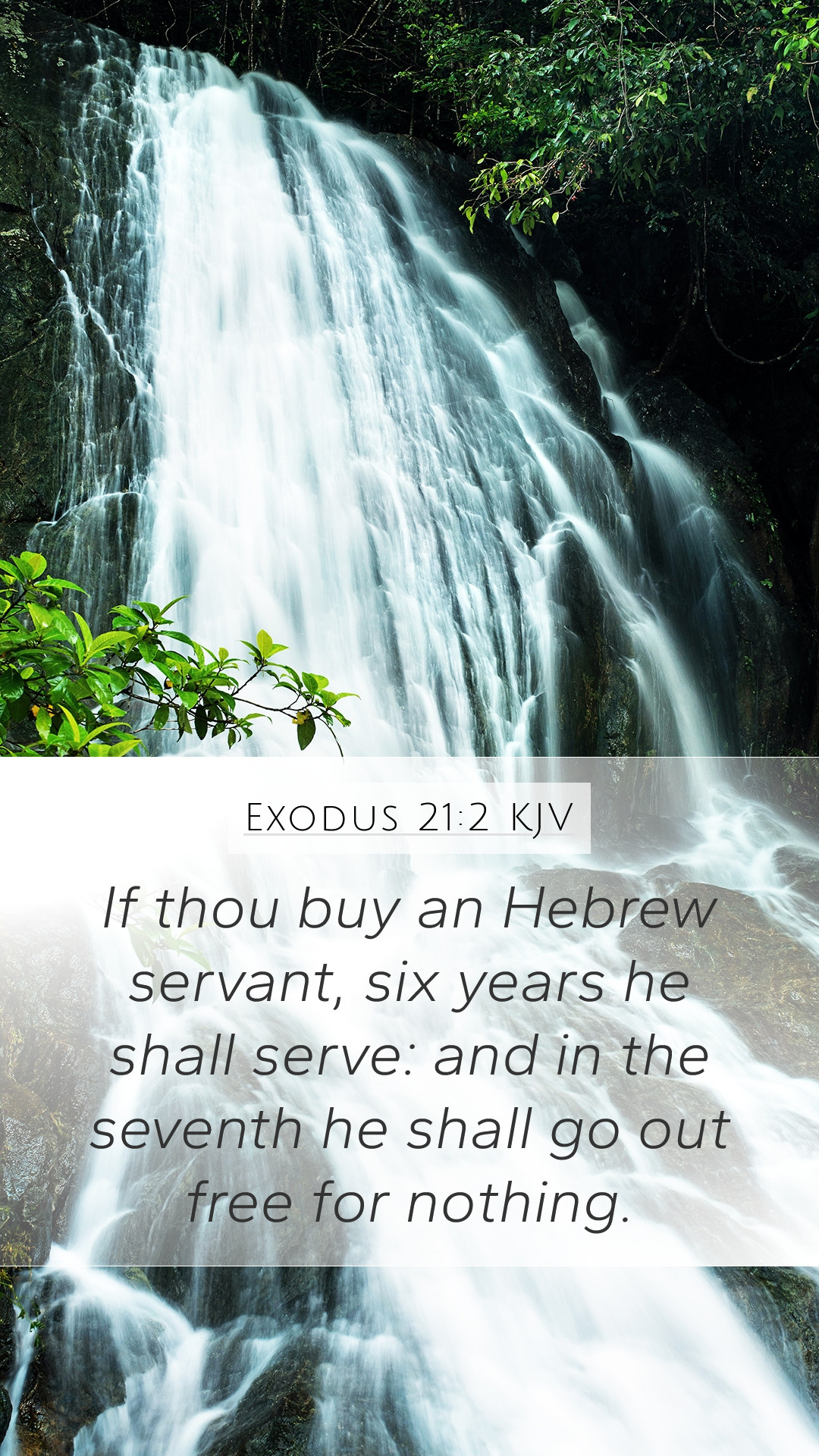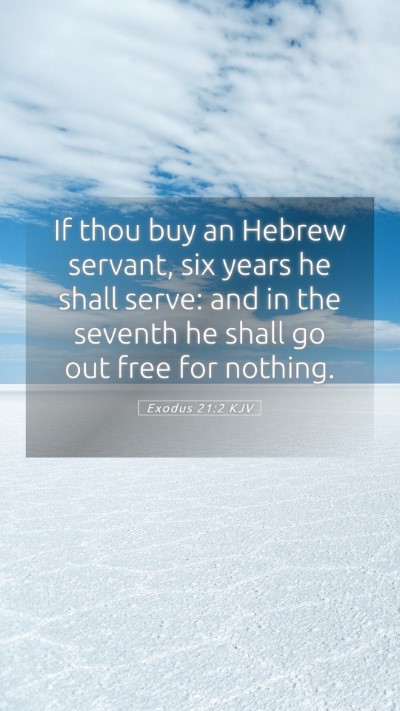Understanding Exodus 21:2
Exodus 21:2 states: "If you buy a Hebrew servant, he shall serve six years; and in the seventh he shall go out free, for nothing." This verse introduces a critical aspect of Hebrew society and its laws concerning servitude and freedom. Below, we explore the meanings, interpretations, and significance of this verse through various public domain commentaries.
Bible Verse Meanings
This scripture serves as a primary law regarding Hebrew servitude, reflecting God's provisions for justice and mercy in a society where slavery was commonplace. According to Matthew Henry, this verse emphasizes the temporary nature of servitude, which stands in contrast to more permanent forms of slavery found in other ancient cultures. This reflects God's desire to promote dignity and humane treatment of individuals.
- Albert Barnes elaborates that the law concerning servitude was designed to protect the rights of the individual while ensuring that families remained intact, particularly during hard economic times.
- Adam Clarke focuses on the societal context of the verse, indicating that such laws were intended to underscore the freedom granted by God, which serves as a precursor to broader themes of liberation seen throughout the Bible.
Bible Verse Interpretations
The interpretation of Exodus 21:2 can be multifaceted. Here are some insights:
- This servitude was not intended as a life sentence but as a means to recover from debt, as noted by Matthew Henry, indicating a more merciful approach than contemporaneous practices among neighboring nations.
- Albert Barnes suggests that the six-year term serves as a reminder of the Sabbath principle—rest after labor, underlining the importance of spiritual as well as physical freedom.
- Adam Clarke highlights that upon completing six years of service, the servant’s freedom was celebrated, representing God's intent for every individual to ultimately find liberation and autonomy.
Bible Verse Understanding
Understanding Exodus 21:2 within a broader scriptural context reveals its purpose and significance in God’s law:
- The verse can be seen as a reflection of God's overarching theme of redemption. Just as the Hebrew servant was eventually freed, so humanity longs for spiritual freedom through Christ.
- Additionally, it aligns with the concept of social justice found throughout the Scriptures, urging followers to treat others with fairness and compassion.
Bible Verse Explanations
When explaining Exodus 21:2, it is essential to connect the text with its legalistic, cultural, and theological implications:
- It emphasizes God's intimate involvement in social laws, highlighting what it means to live justly in community.
- The specifics of the law also educate readers on the proper treatment of those who might find themselves in servitude, ensuring humane and fair practices.
- Moreover, it invites believers to reflect on their own lives and relationships, urging them to embody the principles of kindness and mercy as exemplified in this verse.
Historical Context of Exodus 21:2
Understanding the historical context allows for a deeper appreciation of the message conveyed:
- During the time of Moses, servitude was a common form of debt relief. Recognizing this societal norm, God provided a structure that aimed to be both fair and reflective of His character.
- The law also represents a departure from oppressive practices that could lead to exploitation, thus paving the way for a community bound by love and equity.
Application of Exodus 21:2 to Daily Life
In applying the teachings of Exodus 21:2, individuals may consider:
- How they view work relationships and the treatment of those in subjugate positions today.
- The importance of mercy and justice in their interactions, realizing that everyone deserves dignity and the chance to start anew.
- Reflecting on the idea of freedom in Christ as it relates to personal struggles and societal injustices, aspiring to embody the spirit of deliverance mentioned in this verse.
Bible Cross References
Exodus 21:2 connects with several other biblical passages that explore similar themes:
- Leviticus 25:39-54 discusses the laws concerning indentured servitude and the conditions of freedom.
- Deuteronomy 15:12-18 reinforces the concept of releasing Hebrew servants every seven years, reflecting God's protection over his people.
- Galatians 5:1 speaks to the freedom that believers have in Christ, resonating with the essence of liberation found in Exodus 21:2.


